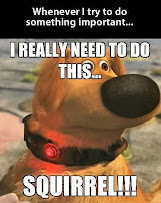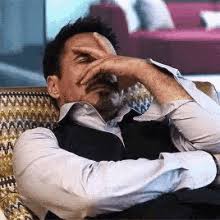I don't know when I made the decision, really; it was a gradual thing that started as a seedling that took root and somehow grew so fast and deep, there was no stopping it. That's not unique for me. I candidly can't tell you how the decision to get married was made. There was no grand proposal. It was much like a business decision that made sense to me at the time, and I convinced my now-husband of 41 years that he should think the same way, and voilà, we were engaged. For better or for worse, as they say. This was much like that.
The very first day I sat down at my laptop in Glenshaw, PA, as a remote worker for a Plano-based company, I had the thought that I could do this for 15 more years and then be free. And I think "free" was indeed the word that came to mind. I didn't mind what I did. Liked it in fact at first, but it was still something I did for someone else that absorbed the majority - the vast majority - of my time. Then, a few years later, I read an article by Suze Orman that extolled the wisdom of working until 70. While I find her tiresome, I accept that she didn't get to where she is in life without knowing something, so I swallowed the somewhat bitter pill that I would have to toil on another five years. I made that mental shift relatively without complaint, looking back on it. I worked from home, dogs at my side. I figured I could tough it out if I set my mind to it, so I did.
But then Neil Peart died, and the seed germinated. It wasn't planted in the ground yet, but it was a real, tangible thing. I had such a crisis that I talked about it with my boss. I explained that I was really struggling in the wake of the 67-year-old's death, having to ask myself if I died at 67, which would be, per my adjusted mindset, before retirement, could I be satisfied with my life? And the answer was a definite no. Despite the tragedy of Neil's death, which rocked me for a lot of reasons, he had done so much and reached the pinnacle of his career, and even decided to set it aside to spend more time with his family. I would not be able to say that. Any of that. I would die knowing I just worked for a paycheck, and had not realized any of the goals I ever had in life (a little over-dramatic, but that's where my mindset was at the time).
Yet, the years wore on. Five of them, to be exact. And what tumultuous years they were. Both personally and for the world. My work status and thoughts of retirement paled in comparison to the pandemic, January 6, dealing with my mother-in-law, who had moved in with us in 2017. But I didn't forget the crisis I'd felt the night I got the news that the man who wrote the lyrics of my life was gone. Those nagging thoughts were always there under the surface.
I began thinking more and more that I was put here to do something else with life. Working with animals, to be exact. That nagging whisper got louder and louder as I progressed into my 60s. How many years - good, productive years - after 70 would I have to do just that? My dad had cancer and died at 77. My father-in-law was younger. He was actually at the threshold of retiring when he became terminally ill. I work to stay healthy, but - ask Neil Peart's family - there are no guarantees.
Then a woman was hired to run our little team. I liked her a lot at first, but it became pretty clear she took me for the village idiot of the group, and it's hard to like someone who doesn't like you, to be honest. However, she wasn't wrong; I had to acknowledge it to her. I knew our industry. I knew our software, since I'd been around it from the beginning, but the other technologies that young, aggressive, upwardly mobile workers wield like weapons weren't necessarily in my comfort zone. We switched to Microsoft and had to start using Teams. To say it was a shotgun wedding for me is to put it mildly. I can use it now, but I wasn't a born natural, and all of that was just an inconvenient irony to someone who had to manage the tech support team with me on it. AI is a big emphasis for us now, and while I do use it and have done some good work using it (ChatGPT created the image at the top), I'm not making it sing like others on the team. I listen to them talk, and they might as well be talking in a foreign language. I'm lost a lot of the time in some of the meetings I am asked to sit in on, saying nothing, trying to look like I'm engaged. What's the saying? You're only as strong as your weakest link, and my link is gathering rust. There just comes a point where it's hard to keep up with how fast things move in business. The seed went into the ground and began to grow at that point.
I actually survived her. She's moved on. But her assessment of me remains. The idea that I was a misfit in the job I had, and wasn't doing what I was meant to do, just grew and grew. Like Jack's beanstock. I floated the idea of leaving to both financial advisors I work with. One, a female, was wonderfully supportive. The man had the same attitude that the now-departed team lead had about my tech skills: idiotic. But I decided to go with my gut, and retirement became a real plan: I would work until the end of the year.
Once the decision was made, it made for a long year to be honest. I was ready for the rest of my life to begin. Somewhere along the way, I started writing again, and have a pretty good start to a book going. I'd like to see it through. Maybe get it published. I want to have a properly clean house that is actually maintained. I want to spend as much time working out as I need, not as much as I have. I want to take the dogs to the dog park and on long walks. They deserve it, and so much more. I want to spend time with my grands while they're young enough to want to spend time with me. I have a LOT of books to read. I just want a breather. All those things I want to do just waited as the year wore on, and thoughts of how cheated my father-in-law felt when his health abandoned him when he was right at the doorstep of his own opportunity weighed on me.
Yet, finally, here I am: only three more workdays away.
People have told me I'll be bored. Watch me. For one thing, the plan is to take six months to make a go of this book, and then find something part-time, but even if I never work another day, trust me, there's so much to do. People tell me I'll go broke, and yes, I very much worry about that. But what I worry about more is going to my grave having never even tried to live my dreams. To try and make the world better, not just live on it. The attempt starts January 1.
To anyone wrestling with the same thoughts and decisions, I can only tell you that you have to take your life circumstances into account and do what's best and right for you. I will tell you, however, it's a lot of emotions, no matter which way you go: I'm scared, but exhilarated at the same time. My mind is racing with all the things I should do around the house, with the dogs, and about the book I'm working on. Six months will fly by. I'm worried about managing the finances - this has been a wicked year financially for us, like it was for so many, and that almost had me walking the decision back more than once. What if no one will hire me? I can only say I don't want to live in my fears, so I'm choosing not to.













.jpg)






